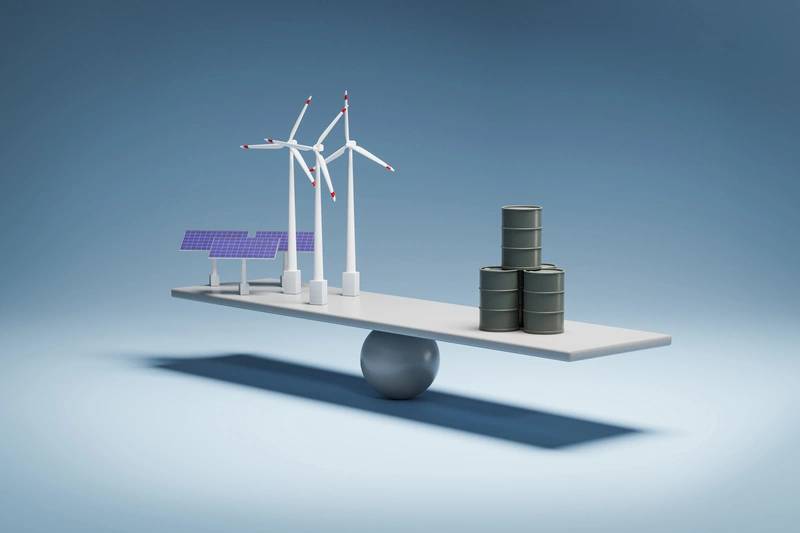Euro Oil Giants Rethink Renewable Balance
Almost five years ago, BP embarked on an ambitious attempt to transform itself from an oil company into a business focused on low-carbon power. The British company is now trying to return to its roots as a big oil and gas player with a growth story to match rivals, revive its share price and allay investor concerns over future profits.
Rivals Shell and Norway's state-controlled Equinor are also scaling back energy transition plans set out earlier this decade. Their change of direction reflects two major developments - the energy shock from Russia's invasion of Ukraine and a drop in profitability for many renewables projects, particularly offshore wind, due to spiralling costs, supply chain issues and technical problems.

BP CEO Murray Auchincloss plans to plough billions into new oil and gas developments, including in the U.S. Gulf Coast and the Middle East, as part of his drive to improve performance and boost returns.
BP has also slowed down low-carbon operations, halting 18 early-stage potential hydrogen projects and announcing plans to sell wind and solar operations. It has recently cut its hydrogen team in London by more than half to 40 staff, company sources told Reuters.
A BP spokesperson declined to comment on the layoffs.
Shell CEO Wael Sawan has vowed to take a ruthless approach to improve its performance and returns and close a yawning valuation gap with larger U.S. rivals Exxon Mobil and Chevron.
The company has scaled back low-carbon operations, including floating offshore wind and hydrogen projects, retreated from European and Chinese power markets, sold refineries and weakened a 2030 carbon reduction target.
Shell is seeking buyers for Select Carbon, an Australian company it acquired in 2020 which specializes in developing farming projects used to offset carbon emissions, sources close to the company told Reuters.
SKILL SHORTAGE?
Some BP employees wonder whether the company retains enough staff with the experience and skills necessary to reestablish itself as an oil and gas major. Employees peppered CEO Auchincloss with questions at an online town hall meeting in early October as he detailed some of his plans for turning the ship around, according to four employees on the call. He told them BP would and could develop new oil and gas production in a reversal of predecessor Bernard Looney’s strategy to build up renewable generation assets, reduce emissions and slowly cut oil and gas output targets.
In conversations with Reuters, some employees said they doubted BP has enough reservoir engineers to jump-start oil and gas output growth after it let go of hundreds of the upstream division’s employees since 2020. The BP spokesperson declined to comment on the town hall discussion.
Equinor, Europe's main supplier of natural gas since 2022, has launched a review of its low-carbon business, named internally REN Adjust, which included scrapping several early stage projects to focus on more advanced offshore wind projects.
When asked for comment Equinor said it was adapting to market realities. "The goal is to strengthen competitiveness and to compete effectively when the industry rebounds after the current down-cycle." But the companies have not abandoned investments in low-carbon energy altogether. Rather, executives said, they are focusing on areas such as biofuels, which they feel confident can generate profit quickly.
Shell, BP and Equinor also continue to develop some offshore wind projects already under way, and say they could invest further if the returns are competitive. They are also developing hydrogen projects to use mostly to lower the carbon footprint of their refining operations.
"What we're finding with our transition growth businesses is that we need to expect the same level of returns as we do from our historic businesses if we're going to deploy material capital over time," Auchincloss told Reuters on Oct. 29.
France's TotalEnergies has become the outlier, continuously investing in low-carbon and strongly outpacing Shell and BP's renewables capacity.
IT'S A BALANCING ACT
The slowdown in the companies' energy transition plans coincides with warnings that the world is set to miss a U.N.-backed target to limit global warming to 1.5 degrees Celsius by the end of the century which is needed to avoid the catastrophic impact of climate change.
It means companies will likely miss, or will have to revise down, emission reduction targets, said Accela Research analyst Rohan Bowater.
And while industry executives focus on boosting near-term returns by spending more on oil and gas, the outlook for fossil fuel consumption is increasingly uncertain. The International Energy Agency said last month it expects global oil demand to peak by the end of the decade as electric vehicles sales grow.
Investors remain sceptical about the European oil giants' ability to sustain profits. Their shares have underperformed U.S. rivals, even as climate-focused investors have lamented the shift from renewables. "To make transition plans stick, companies need the right incentives for management, a clear mandate from shareholders, and a focus on demonstrating value," Bowater said. "BP, for instance, remains caught in the middle, struggling to balance low-carbon investment with shareholder expectations."
